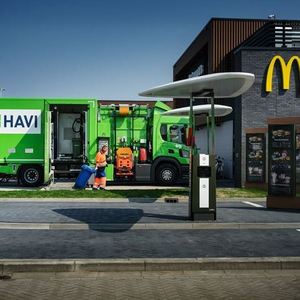Circular-economy partnership formed in the Netherlands

Photo: Neste Corp.
June 25, 2020
BY Ron Kotrba
Renewable diesel producer Neste Corp. announced a circular-economy partnership June 24 with McDonald’s Netherlands and HAVI, a global supply chain company. Used cooking oil (UCO) from McDonald’s Netherlands will be turned into renewable diesel by Neste at its plant in Rotterdam, and then the fuel will be used to power HAVI trucks that both collect UCO from and deliver goods to McDonald’s restaurants in the Netherlands.
“We are big enough to make a difference,” said Jeroen Dekkers, head of the McDonald’s Netherlands supply chain. “Circularity and reducing waste are one of the pillars of our ongoing sustainability program.”
Neste has been active in the Netherlands since 2011 when the Rotterdam biorefinery began operating. Last year, Neste opened a new office in Hoofddorp, near Amsterdam, which serves as the global hub for its renewable aviation business. Its renewable diesel has been available in the Dutch market since October and can be found at more than 90 locations throughout the Netherlands.
Advertisement
Advertisement
Advertisement
Advertisement
Related Stories
At the University of Missouri, plant biochemist Jay Thelen is using arabidopsis as a powerful model to explore ways to boost oil production — an important step toward creating more sustainable, plant-based energy sources.
Iowa farmers have a new market opportunity for their 2025 soybean crop. Landus is expanding its Clean Fuel Regulation initiative, made possible by recent policy changes expected to increase Canada's demand for liquid biofuel.
Topsoe, a leading global provider of advanced technology and solutions for the energy transition, has been selected as the renewable diesel technology partner for CountryMark’s Mount Vernon, Indiana refinery.
The U.S. exported 35,953.6 metric tons biodiesel and biodiesel blends of B30 or greater, according to data released by the USDA Foreign Agricultural Service on Aug. 5. Biodiesel imports were at 2,148.9 metric tons for the month.
XCF Global leverages Alfa Laval technology to enhance pretreatment capabilities at New Rise Reno facility
XCF Global Inc. on Aug. 5announced it leverages Alfa Laval Inc. pretreatment technology at its New Rise Reno biorefinery, a sustainable aviation fuel (SAF) plant located in Nevada. The pretreatment technology enhances feedstock flexibility at the plant.
Upcoming Events










